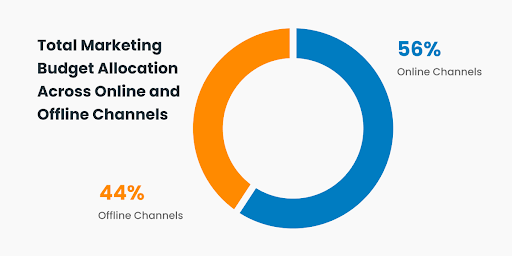Innovative Marketing Technology to Use for Your Business
The latest marketing technology can help you design and execute your digital marketing strategy. In this article, we will be exploring why you need to incorporate innovative marketing technology into your company’s plans.
According to Gartner, 56% of marketing investments are allocated to online channels, as they present businesses with multiple outreach possibilities and data insights.
No matter where you are on your business journey, you’re probably using some of the essential marketing technologies already. Some of the most popular martech tools include:
Looking for a service provider? Check out Top Design Firm’s list of leading digital marketing companies.
Content Management System
A website or content management system (CMS) may distinguish your online presence, but you need to really employ marketing technology services to really nail it.
Website content is crucial to your success, as customers can have direct access to your services or products. Your website keeps prospects and customers updated about your offer. Additionally, your site should collect insights about your audience and show how visitors interact with a given piece of content.
Additional reading, ‘HubSpot vs. Hootsuite: Key Differences.’
Analytics Software
Data such as time spent on a web page, conversion rate, or bounce rate can be accessed through an analytics tool.
This quantitative data gives you a picture of what is happening on your website. But you can take it a step further and analyze data using AI technology.
With AI in place, you can predict how customers will perceive your next campaign or you can segment your audiences to offer them a greater level of personalization.
Email Marketing Automation
Email marketing is still relevant, as it provides ways to connect and engage with customers through content marketing, special offers, and loyalty bonuses. With email marketing, you can connect with prospects and nurture leads if you have the right marketing personalization tools at hand.
82% of businesses are looking into the possibilities of adding, removing, or replacing software in their marketing tech stack, per Marketing Trends Survey 2022. The new capabilities of martech innovation encourage organizations to get up to speed.
Additional reading, ‘Best Practices for Email Marketing Automation.’
Need help selecting a company?
Based on your budget, timeline, and specifications we can help you build a shortlist of companies that perfectly matches your project needs. Get started by submitting your project details.
The Future of Marketing Technology
The exciting thing about martech is that it constantly evolves — and so do software solutions. Marketers need to be aware of this continual evolution and strive to choose innovative marketing tools that better meet their objectives.
In a Martech Replacement Survey 2022, it became clear that there is a trend of replacing the existing marketing technology stack with better, new technology in marketing.
The top five martech tools that are marketing automation, CRM, SEO tools, email distribution, and work and project management.
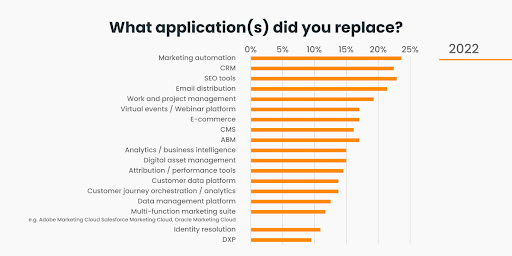
Source: martech.org
The reasons for replacing software revolve around delivering better features and easier integration.
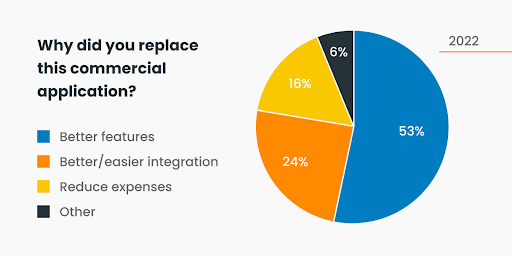
Source: martech.org
Additionally, factors influencing the replacement of homegrown or commercial applications involve data centralization (50%), ROI measurement (50%), and the digital experience customers have with businesses (47%).
Make sure you tap into new technology in marketing to increase the appeal and ultimately improve your bottom line.
Innovative Marketing Technology Tools
AR/VR
Augmented and Virtual Reality (AR and VR) are no longer about video games — they’re making their way into innovative marketing technology. Brands use AR and VR technologies, or both, to enhance user experience.
VR is currently used by 32% of customers when buying retail products and luxury goods. A recent study investigated how AR and VR influence consumers, and the findings demonstrate that these technologies can position brands in a curious and attractive manner, enhance marketing, and positively influence purchasing behavior.
IKEA, for example, enables customers to view how a furniture piece will look in their interior through an AR app called IKEA Place. Audi and Volkswagen use VR to let clients really get a feel of what it is like to sit in a car they are considering before they actually come into a physical store.
AI & Natural Language Processing
Advertising becomes even more sophisticated and intelligent when powered by AI implementation and Natural Language Processing (NLP). Together, the two create cognitive advertising — one of the powerful marketing personalization tools you can use.
Cognitive advertising collects a multitude of data about customers’ online behavior and predicts how an individual may respond to an ad. Additionally, this technology maps patterns in consumer intent and can present browsers with targeted, relevant ads, even in a cookieless environment.
Let’s say a person is looking for tents; the next logical step for cognitive advertising is to recommend hiking boots, sleeping bags, flashlights, or any other product related to camping to take the purchasing behavior further. Cognitive advertising can segment audiences, deliver smart automation, provide real-time insights, and enable personalization.
Creating a cognitive ad takes creativity and a very basic understanding of neuroscience. While the technical side can measure human interaction with a cognitive ad, the scientific approach states that the less cognitive energy the human brain produces to digest the ad, the better. Low-cognitive ads create a lasting impression on recipients. The creative part always involves choosing ideas, items, and imagery that can be easily associated with a brand.
Chatbots
Some valuable examples of marketing technology include chatbots. Chatbots are pre-programmed applications that aim to automate communication with customers approaching a business through a website or app. Your brand can have 24/7 availability whenever a consumer needs it.
From banking and finance to health and retail, chatbots can have human-like conversations with customers.
Chatbots can serve multiple purposes — they can act as customer support agents, transaction tools, information gathering solutions, and “skills chatbots” that are programmed to perform an action such as placing an order or making a transaction.
To know which chatbot your business needs, analyze your customers’ buying journey, see where there are recurring communication patterns and where you can automate repetitive tasks through a chatbot, and power your service with an intelligent bot.
For instance, Domino’s Pizza created a chatbot that lets you place an order, review orders made in the past, and see status updates on active purchases.
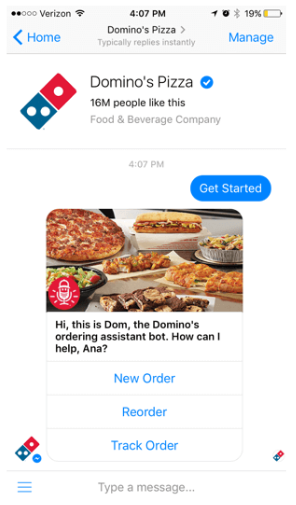
The company stretched its services across a number of platforms including Slack, Apple Watch, and Messenger.
Internet of Things
The Internet of Things (IoT) is a promising field in terms of the latest marketing technology. Smartphones, smartwatches, and other devices powered by the internet are commonplace, and even smart homes are starting to gain popularity.
Additionally, smart cities improve their management of public transit, road systems, and wastewater systems through sensor technology for a better quality of life, economic competitiveness, and environmental sustainability.
Such a level of device interconnectivity presents valuable data insights for government and businesses. Statista estimates that IoT-connected devices worldwide will total 38.6 billion by 2025.
Placing themselves in the center of martech innovation, owners of smart homes can use the Echo application created for smart speakers to access services and perform everyday tasks.
Echo speakers are based on Alexa Voice Service (AVS), which learns to recognize your voice and execute your commands. You must be logged in to your Amazon account to enable this service. With access to your location and prior purchasing history, Echo can execute most relevant requests: ordering pizza, calling a cab, or making a reservation at a restaurant.
Thanks to the Alexa Skills Kit, Amazon Echo allows companies to add their apps to get additional customer traffic and generate data insights.
Mobile Experiences
With the customer-first attitude and programmatic power of innovative marketing tools, you can entirely rethink mobile experiences for your clients.
Not only should your site be adapted to mobile devices for search engine visibility, but you should also leverage mobile interactions. 58% of smartphone users are more likely to purchase from companies if their mobile sites or apps allow them to buy quickly, as per this guide suggested by Google.
By crafting industry-specific mobile experiences, you place your products just a few clicks away. Nike, for instance, made a self-service feature to complement in-store interactions.
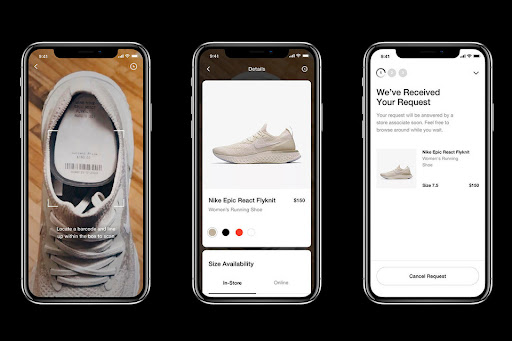
App users can find out whether the desired shoes are in stock in a specific store by simply scanning the bar codes. They can also get rewards and discounts within the app.
Blockchain and DLT
Blockchain and distributed ledger technologies (DLT) have matured to such an extent that they can facilitate the way businesses interact. The technologies in question can facilitate interoperability, scale when needed, and ensure secure connections.
The use of blockchain and DLTs goes beyond financial institutions and can cover multiple use cases such as data exchange, product tracking, executing smart contracts, or ensuring safe transactions.
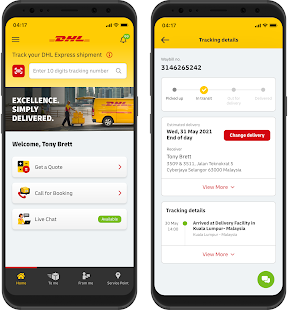
DHL, a famous American shipping company, is embracing blockchain logistics technology to the fullest. The company tracks shipments and executes safe transactions through blockchain.
Benefits of Innovative Marketing Technology
The latest marketing technology allows you to strengthen your marketing efforts while delivering value to your customers. Coming with a bundle of benefits, innovative marketing technology has a client-centric approach, inevitably leading to an increased client satisfaction score and, ultimately, more sales for you.
Personalization
New technology in marketing has way more sophisticated mechanisms to market to an individual, rather than trying to sell irrelevant offers to a mass market. Since 71% of customers expect a personalized interaction, you can address that by properly leveraging the latest marketing technology and integrating it into your roadmap.
With marketing innovation technology, you can tune your website to such an extent that each user will see content tailored to their needs. Suggestions will be based on the user’s prior online behavior and search.
Efficiency
Innovative marketing tools also help you maintain a productive team. Thanks to advanced AI algorithms, you can segment clients, visualize data received, and predict customer outcomes automatically, freeing up time for your team to focus on other tasks or optimize current implementations.
Facilitating business processes with the latest marketing technology increases the number of more tailored and diversified campaigns based on prior data collection and analysis, giving your business 24/7 exposure if you utilize AI.
Chatbots running on AI can be programmed to answer customer questions around the clock. You can better manage your campaigns if you bring all these tools under one roof, instead of implementing them in an inconsistent and scatty manner. Careful integration of tools is your key to creating an optimal smooth, efficient system for all involved, including the customer — thus, improving your brand image at the same time.
Deep Insights
From all of the above implementations, you will then be able to track the performance of your content marketing, ad campaigns, and customer online behavior to obtain insights and detect patterns, driving your decision-making forward — creating a feedback loop of continual iteration and improvement.
Measurable Results
Unlike traditional marketing, marketing personalization tools allow you to track metrics such as time on page and the number of clicks, views, and shares — all you need to know about your customers is visualized and presented to you in real-time. What’s more, the latest marketing technology gives you a vision as to what is likely to be a successful future campaign based on predictive analytics.
Customer Engagement
The latest marketing technology puts customer experience first. You can send tailored emails with relevant content, create immersive experiences with your product, or let customers attend events from the comfort of their homes. Innovative marketing technology enhances user experience and as time goes on more and more tools behave increasingly like humans might, making a better, and more lasting impression on users.
Innovative Marketing Tools Drive Business Development
The innovation in marketing technology and its capabilities enable you to discover increasingly more meaningful ways to connect with customers. Recognizing the need to put the customer first means giving way to a more sophisticated tech stack.
You can benefit from a continual flow of data insights and disperse updated information across teams for crafting personalized outreach initiatives and planning effective marketing campaigns based on relevance rather than arbitrary assumptions.
Explore the latest marketing technology and let it take your strategy further as you implement innovative marketing tools.
Additional Reading
- 7 SaaS Marketing Strategies to Attract Customers Online
- Benefits of HubSpot for Digital Marketing
- 7 SEO Automation Tools for Better Rankings
Need help selecting a company?
Based on your budget, timeline, and specifications we can help you build a shortlist of companies that perfectly matches your project needs. Get started by submitting your project details.
